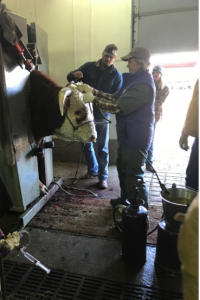At 18, moving 1,093 miles away from home to come to the University of Wyoming was one of the craziest things I had done to date. Coming from Santa Paula, California to Laramie, Wyoming was something I never saw myself doing, but if I had not I would have discovered something that has fascinated me since my first day of classes: high-altitude pulmonary hypertension, or brisket disease. Growing up at sea-level I had never encountered anything like brisket disease, which for those unfamiliar, is a respiratory condition that affects cattle at high altitudes due to the strain on the heart’s right ventricle. I instantly found myself fascinated with the disease, wanting to know everything I could. Second semester of my freshman year I had the opportunity to go listen to a presentation by Dr. Tim Holt, who is the leading researcher of brisket disease. I think back to that day and how inspired I was by Dr. Holt, he spoke of his sort of bumbling past, and his peers’ doubts in his abilities. I related to him in a way because I was not raised on a ranch, and my own suspicions were rising because I had only ever raised show pigs, not massive cattle herds like my new peers.
My new fascination of brisket disease soon found me reading most of Dr. Holt’s published works and just about anything I could find on the topic. So earlier this year, I received an email that Dr. Holt was at the UW farm preforming pulmonary arterial pressure (PAP) tests, and better yet that students were welcome to go observe him. I jumped at the chance, because it was not only the opportunity to observe PAP tests on bulls, but to get to see the inventor of the test and someone who I held in such high respect.
Upon my arrival, it seemed like any other Friday for Dr. Holt, just going through the motions of the PAP test that he had performed thousands of times. Placing the needle into the jugular of the bull and then threading a 4-foot catheter through the heart and into the pulmonary artery, like it was second nature. He took the time to explain each step to me, making sure I understood what he was doing, and even laughing as he struggled to get one bull stuck just right, saying that even after all this time he was still not perfect. When we came to a break in the chaos, Dr. Holt asked me about myself, and when I said I wanted to do research in bull genetics, he lit up in the same way I did reading that initial email. We chatted about graduate schools and our mutual fascination with brisket disease. Once he went back to testing, he brought in three massive Herford bulls, I was taken back by their sheer size.
This experience cemented the idea that I wanted to base my career around the study of bulls, because it showed me their grandeur and imperfections. I know it sounds ridiculous, I would laugh if someone else said it. It just somehow validated that 1,093-mile blind leap, because UW gave me the tools to not only find my passions, but to be able to get hands on experiences, and that is something not many places can offer.
-Emilee Inez

